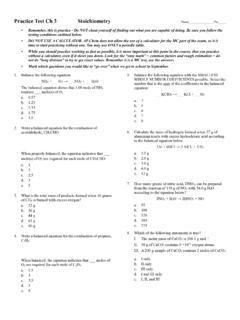Transcription of The Psychology of Voting - Stanford University
1 The Psychology of Voting by Jon A. Krosnick Professor of Psychology and Political Science Ohio State University Screen 1: Choosing a President is Like Choosing a Movie Chooser Imagine that this coming Saturday, you re going out to the movies with a friend; to be nice, you ve decided to let your friend pick the movie you ll see. Who would you rather the friend be: (1) someone who shares your taste in movies but doesn t read movie reviews and knows nothing about which movies in the theaters now are dogs, (2) someone who reads lots of movie reviews but doesn t like all the things you like, or (3) someone who once picked out a movie for you to see that you liked?
2 In other words, should you choose someone who shares your preferences, has expertise, or has a small track record of success in the past? That s the sort of decision all Americans face every time they have to vote in a presidential election. Should we endorse the candidate who agrees with us most about what government should do (Keep abortion legal or outlaw it? Make it harder to buy a handgun in America, or make it easier?)? Or should we endorse the candidate who knows the most about solving the nation s problems? Or should we throw our support to a candidate whose party has proven to be the most successful in running the country in the recent past?
3 Rarely do we find all these desirable qualities in one candidate, so we have to decide how to decide which criterion should rule the day this time around? Screen 2: Representative Democracy If you vote for the candidate who shares your vision of what government should do, you re living by the principles of representative democracy, in which elected representatives do what their constituents want them to do. This is like preferring to go the movies with a friend who likes the types of movies you like, at the risk that he or she will pick out a real loser sometimes. But Voting this way is hard: you have to know what you want government to do on policy issues, and you have to know what the candidates want government to do.
4 When the issues involved are complicated and require you to know a lot before you can make up your mind, it may be tough for you to decide what you want government to do, unless you stop everything else in your life to study the country and its needs (ridiculous, eh?). Of course, if the candidates don t explain where they stand on issues you care about, you may not be able to tell for sure. And even when candidates do say where they stand on issues, you may not be confident that they will follow through on what they promise during a campaign. Screen 3: Guardianship Democracy and Performance Approval If that seems too difficult, you might throw up your hands and decide to vote in a different way: choose the candidate who seems the most intelligent and knowledgeable and will be best at figuring out how to solve the country s problems.
5 If you do this, you re endorsing guardianship democracy, where elected representatives decide on their own how government should operate. In this world, representatives lead the people, rather than following the people s instructions. This is like preferring to go to the movies with someone who knows a lot about what s in the theaters, so you re sure to avoid the awful films out there, even if the one you see doesn t perfectly fit your taste. Discerning which presidential candidate is the most intelligent and knowledgeable may be easy in some elections and difficult in others. So if it proves too hard, you can always look back at the person who is currently President and decide how good a job he (or she?)
6 !) has been doing while in office. If the country s economy is in good shape, crime rates are low, poverty is low, and we re not threatened by foreign countries or terrorists, you might decide the party now in the White House is doing well enough to deserve to continue in control. If it ain t broke, no need to fix it, goes the old saying. But if things seem to be going badly for the country, it might be a good time to change leadership. This way of thinking is called performance approval. Screen 4: How Do Americans Really Vote? Well, all that is in theory those are some of the approaches people can in principle take when choosing their President.
7 But how do Americans actually vote? For over 50 years, political psychologists have been studying Americans Voting decisions in Presidential elections, and they re come up with soma fascinating insights. These studies have been of two sorts. Some involved surveys of representative samples of Americans, asking them how they perceive the candidates and the country, what they want done in the future, and how they voted. Other studies involved presenting hypothetical candidates to participants in laboratory experiments, manipulating the characteristics of the candidates, and seeing how people s hypothetical vote choices are affected.
8 The first lesson learned is that the single most powerful predictor of a person s vote choice is his or her political party identification, as a Republican, a Democrat, an Independent, or a member of another party. Usually, a person affiliates with a party because that party shares his or her preferences on the handful of policy issues that he or she cares most deeply about. So Voting based on party is an easy way to vote for the candidate who will push government to do what you want it to do most. Second, research has shown that voters perceptions of candidates personalities (their intelligence, their knowledge, their trustworthiness, and their ability to be strong leaders) also predict some people s votes very well.
9 And people s assessments of the health of the country predict other people s votes. So it looks like most Americans vote according to the principles of representative democracy, but guardianship democracy and performance appraisal are approaches alive and well, too. Screen 5: Quirks in Implementation Recent psychological research has turned up some interesting quirks in the ways people evaluate presidential candidates, many of which are surprises to political consultants and campaign advisors. For example, most campaigns save their advertising money for the end of the campaign, so they can put ads on television during the final weeks or days of the campaign.
10 This approach is based on the assumption that voters are most influenced by what they learn most recently. But it turns out that in politics as in all other areas of life, first impressions are very powerful and inertial. Once you form an impression of a person, it colors how you interpret new information about the person. So candidates would get more bang for a buck spent on advertising if they spent it early in a campaign rather than late. Another popular assumption among political observers is that most Americans are pretty cynical about politicians and expect the worst from them. But instead, political psychologists have found that when Americans begin to learn about a new politician, they approach him or her optimistically, hoping for a white knight to appear who will be competent, trustworthy, and effective.







